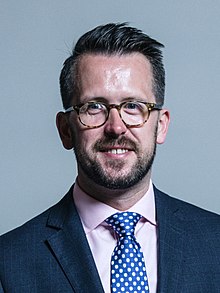Stewart Malcolm McDonald – 2022 Speech on NATO and International Security
The speech made by Stewart Malcolm McDonald, the SNP MP for Glasgow South, in the House of Commons on 19 May 2022.
It is always a pleasure to follow the right hon. Member for New Forest East (Dr Lewis), but I am afraid that, at the beginning of his speech, he somewhat misled hon. Members. He said that he would not say things that he had said before, but by the end of his speech, I was pretty certain that he had made those points previously—in fact, he tends to make them whenever I follow him. However, as always, he was worth listening to.
I commend the way in which the Secretary of State opened the debate. Despite his attempts to tease Labour Front Benchers and me—more of that to come, I am sure—he opened it in a suitable fashion. One might even think that he had in mind a future position in Brussels that might come up at NATO at some point later this year. He is far too popular for the Prime Minister, so he may not be Secretary of State for too much longer. [Interruption.] I am sure he would be most welcome in the Scottish Parliament.
I will try to be brief because I am conscious of time. NATO is clearly one of the two main pillars of Euro-Atlantic security. The Secretary of State himself identified the European Union as a strong player in some of the non-hard military capabilities that are required to underpin peace on the continent of Europe. It is undoubtedly correct that NATO is at the forefront of providing hard military defence and security to its member states, but Europe leads in other areas outwith that. The Secretary of State mentioned some—for example, cyber—but we should also look at energy, trade, resilience and crisis management. He is right that the two institutions should not compete but complement one another.
Britain is in a slightly different role in that it has recently left the European Union but remains a member of NATO, so it taps into only one of those two pillars of Euro-Atlantic security. I repeat what I said earlier, that we should seriously consider a comprehensive defence and security treaty with the European Union. I suspect we will end up in that position at some point, although perhaps not under this Government.
The Secretary of State went through some of the history of the alliance, not least its doubling in size over the past 70 years. We now have two applicants in Sweden and Finland. I suspect that the Secretary of State is right that they will join, despite the noises from Turkey. Undoubtedly, both countries will be positive, contributing members of the alliance, producing strong defence, resilience and security. The Scottish National party absolutely supports their application.
I want to consider the Strategic Concept. As the Secretary of State mentioned, we have had the strategic compass from the European Union—I think there is still a bit to come. The Strategic Concept is second in importance only to the Washington treaty and is undoubtedly a major turning point in the ongoing Euro-Atlantic security debate. The shadow Secretary of State is right that it is a shame that it is open only to Governments to participate, but I accept the Secretary of State’s generous offer to have a discussion with him and his officials before the concept is published next month in Madrid.
I am slightly worried about some of the noises from the Foreign Secretary, and I understand, if the media are to be believed, that so are some Members on the Government Benches. The concept, which she has repeated without any detail, that we need a global NATO causes me concern. The Strategic Concept should underline that NATO’s primary focus is the Euro-Atlantic area. We do not need NATO to gallivant around the world. I know that the Government have an obsession with the Indo-Pacific tilt that they want to try to implement, but surely 24 February, if not 2014 and 2008, has told us that the Euro-Atlantic area needs to be NATO’s primary focus, not a global NATO. Although there is no detail about what the Foreign Secretary means by that, I reject it in its entirety.
Bob Stewart (Beckenham) (Con)
On Monday and Tuesday, I had a long conversation with Ukrainian politicians on the border. They stressed to me how vital it is that the United States stays deeply committed to Europe and NATO, and that that is the lesson of what has happened since 24 February.
Stewart Malcolm McDonald
I do not disagree with any of that. I am not sure whether perhaps the right hon. Gentleman has misunderstood the point that I was making, but I do not disagree at all. The United States is clearly very important to NATO, but NATO’s primary area of focus and operation, on the map, is the Euro-Atlantic area, and my concern is that the Foreign Secretary seems to want to take that further, with talk of a global NATO. Given that we do not know what she actually means by that, perhaps I have already given too much time to it, but it does cause me concern.
As the shadow Secretary of State said, we need to try to open things up with future strategic concepts. No multilateral international organisation, however important, has a right to exist; it always requires work to get the consent of the public. Undoubtedly NATO has that—it has proved this year alone just how useful it is—but it does need to democratise, and the processes for future strategic concepts need to be opened up not just to political parties, but to non-governmental organisations and others. We want to see coming out of the strategic concept a focus on resilience, on emerging disruptive technologies and on ensuring that the eastern flank of NATO is enhanced, as the Prime Minister of Estonia—the new Iron Lady, as she is being called—has been calling for. We would support that.
The Secretary of State knows that we have supported the Government in every move that they have taken to support Ukraine militarily, economically and in many other fields. Our only criticism, a deep and profound one, is how incredibly slowly we are helping Ukrainian refugees, but that is perhaps not for this debate. However, I am interested to tease out of the Secretary of State or the Minister where we are with planning to help to rebuild Ukraine.
The right hon. Member for New Forest East (Dr Lewis) was correct to say that no one expected that Ukraine would fight so valiantly and last so long against Russia, or that Russia would crumble. No one saw that coming. Getting on to a debate about rebuilding Ukraine is therefore hugely important, and clearly the Ministry of Defence has an important role to play. Members on both sides of the House need to start engaging in this, not least because Ukraine is hoping next year to host the Eurovision song contest, which, as the Secretary of State said, will take place, one way or another, on the territory of a free Ukraine.
The Scottish National party supports Sweden and Finland in their accession to NATO. We are analysing that process very closely, as Members might well understand. We support the Government in going into the strategic concept if they are serious about democratising it and addressing the challenges that we face in the Euro-Atlantic area.
Given the assault on the international order by Vladimir Putin in Ukraine, its continuing fraying and testing in other parts of the world, and the technologies that are used to deepen and hasten that, we need to work together, irrespective of the differing political and constitutional views of hon. Members present. We need to work together because we share values, and those values do not deserve to exist just because we think so; we always need to make the case for them robustly even where there are disagreements. I wish the Secretary of State well for the upcoming strategic concept and look forward to discussing it with him before he heads to Madrid next month.


